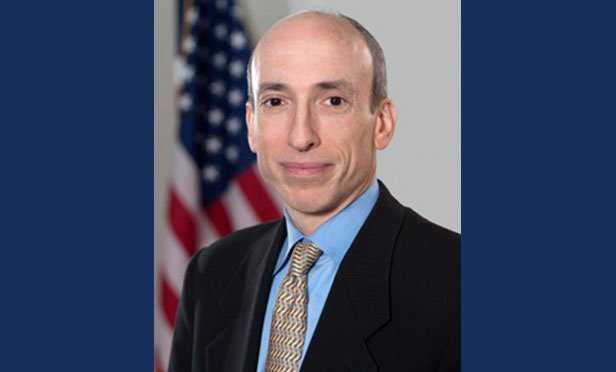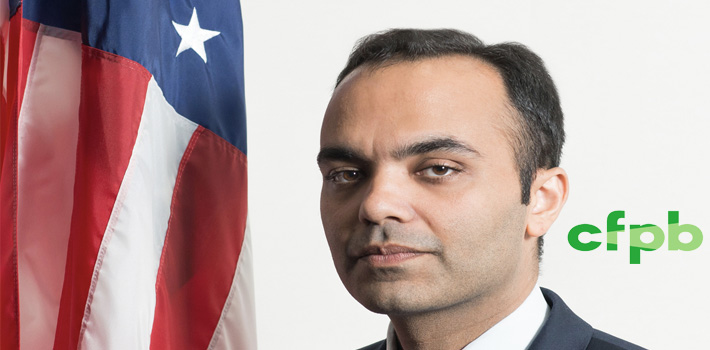Archive for 2021
Biden SEC Pick: MIT fintech professor, helped create Dodd-Frank
January 21, 2021 As President Biden’s executive appointments await senate approval, crypto and security holders will be waiting anxiously for one in particular: Gary Gensler. A seasoned financial expert in and out of the public and private sector, Gensler most recently taught blockchain finance classes at the MIT Sloan School of management. What will this crypto researcher bring to the SEC?
As President Biden’s executive appointments await senate approval, crypto and security holders will be waiting anxiously for one in particular: Gary Gensler. A seasoned financial expert in and out of the public and private sector, Gensler most recently taught blockchain finance classes at the MIT Sloan School of management. What will this crypto researcher bring to the SEC?
By looking at his past research topics, and class syllabi, there may be some foreshadowing. Much of his focus has been on emerging fintech in business. Gensler doesn't just support innovation in banking and finance; he has been actively teaching grad students how to build blockchain-based businesses for the past couple of years.
Last spring, he taught a course called "Fintech: Shaping the Financial World" focused on leveraging blockchain tech and AI.
"This technology has real potential as a catalyst for change in the world of finance and the broader economy," Gensler said in testimony before Congress. “Though there are many technical and commercial challenges yet to overcome, I’m an optimist and want to see this new technology succeed.”
When it comes to regulation, Gensler is light, explicitly stating in an interview with another MIT researcher, “we must preserve the freedom for firms to fail,” and that “it’s best to show some flexibility.” While it is true that activity of any significant size has to be contained within the current regulatory framework,” Gensler said, “the government should put smaller firms in “a regulatory sandbox.”
Before teaching about bitcoin, Gensler worked at Goldman Sachs, where he made partner by 30 years old, the youngest ever to make partner at the time. He went on to lead the team that advised the NFL in the most lucrative TV in history in 1990.
After leaving Goldman, Gensler worked in the US Treasury and eventually chairman of the Commodity Futures Trading Commission under Obama. Though he calls for easy regulation for smaller firms, His work at the CFTC following the 2008 financial crisis culminated in the 2010 Dodd-Frank act.
When it comes to cryptocurrencies, Gensler has said the regulatory framework would “guard against illicit activities, protect investors and their funds, and promote market integrity.”
He has said cryptocurrency, in general, is both a security and a commodity. Some coins like Ripple are more securities, while Bitcoin is not.
Outgoing President Trump Extends Clemency to Jonathan Braun
January 20, 2021 President Trump issued an executive grant of clemency to Jonathan Braun on Tuesday, commuting his sentence to time served. Braun checked into FCI Otisville last year to continue serving a sentence for a marijuana-related conviction in 2011.
President Trump issued an executive grant of clemency to Jonathan Braun on Tuesday, commuting his sentence to time served. Braun checked into FCI Otisville last year to continue serving a sentence for a marijuana-related conviction in 2011.
The executive order requests that he be released as fast as possible.
A statement from the White House said that “upon his release, Mr. Braun will seek employment to support his wife and children.”
Official Who Wants to “Wipe Out” Merchant Cash Advance Will Be Next CFPB Head
January 18, 2021 Rohit Chopra, an FTC Commissioner, will take over as head of the Consumer Financial Protection Bureau under incoming President Joe Biden, sources say.
Rohit Chopra, an FTC Commissioner, will take over as head of the Consumer Financial Protection Bureau under incoming President Joe Biden, sources say.
Chopra’s name made the rounds in 2020 when he told NBC News that he was looking for a “systemic solution” that can “wipe out” all merchant cash advance companies.
His candid comments aligned with an official statement he put out in August in which he opined that the structure of MCAs “may be a sham since many of these products require fixed daily payments…”
He further added that there were “serious questions as to whether these merchant cash advance products are actually closed-end installment loans, subject to federal and state protections including anti-discrimination laws, such as the Equal Credit Opportunity Act, and usury caps.”
His transfer to the CFPB could be viewed as unwelcome news for the MCA industry as the agency is currently in the process of finalizing the types of financial institutions it believes it should maintain some jurisdiction over. Originally, MCA companies were poised to be excluded from the data reporting requirement set forth by Section 1071 of Dodd-Frank but that could very well soon change.
Shark Tank’s Kevin O’Leary: Bitcoin Not Ready to Swim With The Big Fish
January 15, 2021 Mr. Wonderful, the Shark Tank multimillionaire, recently said that while Bitcoin may be going through an exciting price discovery phase, it is not liquid enough to garner genuine institutional interest.
Mr. Wonderful, the Shark Tank multimillionaire, recently said that while Bitcoin may be going through an exciting price discovery phase, it is not liquid enough to garner genuine institutional interest.
“If I want to buy a million dollars’ worth of Bitcoin right now, I’ve gotta do a fair amount of work to pull that off,” he said. “I can’t get consistency with any single regulator on endorsing bitcoin for me to actually do a significant transaction.”
The price of Bitcoin grew significantly at the end of 2020, in three months quadrupling to reach $41k at it’s height. Still, as O’Leary explained on the popular finance podcast “The Pomp” and shared on the O’Leary youtube channel: cryptocurrency is nothing compared to other asset classes.
“Bitcoin is still a nothing-burger,” he said, “a giant nothing-burger.”
Before the asset class becomes big enough for the largest whales to sink billions into as an asset class, cryptocurrencies will have to change. It is simply too challenging to put money in and take money out, and unclear how that will be taxed or regulated in a personal or institutional portfolio.
In the future, O’Leary expects major regulation to approach the crypto space, as evident recently with the SEC charging U.S.-based Ripple over its XRP token.
“Give me the top seven cryptocurrencies, put them into an ETF wrapper, and let me invest in it with liquidity,” O’Leary said. “So that if I want to buy a million dollars of it in the morning and sell a million dollars in the afternoon, I can do that in an ETF format.”
But one thing that cryptocurrency proves, O’Leary said, is that traditional asset classes can be sold 24/7 just like digital currencies.
“Maybe what Bitcoin is telling us is we should have liquidy perpetually, pure price discovery because its always breakfast somewhere in the world,” O’Leary said. “It may be the way of the future, and in a way, if that happens, there would be less demand for something like Bitcoin.”
Transcript and Recording of Major FTC Case Before the US Supreme Court
January 14, 2021Oral arguments took place yesterday in AMG Capital Management, LLC et al. v Federal Trade Commission before the United States Supreme Court. At issue is the debate over whether or not the FTC has the authority to force defendants to disgorge with “illegally obtained” funds when a lawsuit is brought under Section 13(b) of the FTC Act.
Transcript here
MP3 Recording Here
FTC Commissioner Rohit Chopra had reportedly told NBC News last April that he was looking for a systemic solution that would “wipe out” predatory lenders. If the Supreme Court rules against the FTC in this case, that plan could be stymied.
ROK Financial Announces Cannabis Banking Partnership with BNB Bank
January 14, 2021Great River, NY: ROK Financial, a leader in the alternative and commercial lending space is excited to announce their newest partnership with BNB Bank’s Cannabis division. This new partnership allows for ROK Financial to offer direct checking and savings to Cannabis businesses through BNB Bank.
“This new partnership is truly filling a void within the Cannabis industry” says James Webster, CEO of ROK Financial “Federal regulations make it near to impossible for Cannabis related businesses to utilize traditional banking methods. We’re proud to partner with a financial institution that sees the value and need within the industry.”
BNB Bank, headquartered in Bridgehampton, NY has 39 locations from Manhattan to Montauk. BNB Bank provides the resources of a strong financial institution, exceptional customer service, and access to a suite of leading-edge money management tools. They are publicly traded on Nasdaq (BDGE) and have a 5-star rating (Bauer Financial). Peter Su, Vice President – Private Banking BNB says: “This new relationship with ROK Financial allows us to service a wider variety of clientele. We’re excited to work with ROK Financials existing Cannabis clients as well as attracting new relationships through this partnership.”
A large majority of traditional institutions tend to shy away to offering traditional banking to the industry as a whole due to the lack of regulations and financial risk they may face. Banks also risk losing their master account with the Federal Reserve due to the ‘risk’ of the industry. “BNB Bank has a board approved Cannabis Banking Policy that we strictly abide to, and have established a compliance monitoring program providing seed to sale regulatory support to ensure we all are in compliance” says Su “We are happy to help provide needed resources to these thriving businesses.”
About ROK Financial
ROK Financial’s team committed to establishing ROK solid relationships with our clients, lenders, and partners. By providing the best financing solutions available to business owners while creating a positive association with business financing. Through our streamlined process, revolutionary technology and educated team of experts, we support business owner’s ability to create new opportunities. ROK Financial is proud to empower the heartbeat of our country, our small businesses.
Megan Capobianco
3500 Sunrise Highway
Building 100, Suite 201
Great River, NY 11739
833-337-6534
press@rok.biz
www.rok.biz
Affirm Goes Public at $11.9B Valuation and Climbing
January 13, 2021Affirm, an online buy-now-pay-later platform, was listed on the Nasdaq on Wednesday at $49 a share under the ticker AFRM. Based on outstanding shares sold to IPO investors, the company saw an $11.9B valuation. Minutes after public sales began at noon, the price shot up to $100/share.
Company founder Max Levchin spoke through the big Nasdaq screen in Times Square as he virtually rang the starting bell. Levchin championed the hard work of the Affirm team.
Hear from the CEO of @Affirm, Max Levchin (@mlevchin) on the company improving the lives of consumers by empowering shoppers with honest financial products. @Affirm joins us this morning to ring the Opening Bell in honor of its IPO. #AFRM pic.twitter.com/QfkZsgXItM
— Nasdaq (@Nasdaq) January 13, 2021
Affirm makes money when a customer uses their tech to make a purchase at the point-of-sale.
Levchin is a member of the “PayPal mafia,” a co-founder of the online payments firm that went on to establish massively successful tech startups. Members of the “mafia” include Tesla’s Elon Musk, Linkedin chairman Reid Hoffman, and Yelp founder Jeremy Stoppelmen.
After publishing earnings this summer, the San Francisco-based firm filed for an IPO on Nov 18. The move revealed revenue of $465M for the first 3 quarters of 2020 with a $66M net loss.
Embedded with the company’s S-1, were comments from Levchin that said:
“The barely-readable fine print makes only one thing clear to consumers: You’ll never know exactly what your purchase will really cost you,” Levchin wrote. “With most of the payments industry deriving profits from late fees, overdraft charges, and gimmicks like deferred interest, it’s not hard to agree that there has to be a better way; it’s time to evolve payments again.”
Levchin took to Twitter to post about the firm, championing the millions of transactions the platform has serviced since 2013, all without one late fee.
“More than eight years ago, we set out to take on credit cards and change the way we pay,” Levchin wrote. “We built Affirm from the ground up to align with the needs of consumers and merchants and to succeed when they succeed.”
Commercial Collections Company Feeds One Million Children
January 11, 2021Roseville, MN—January 11, 2021—Dedicated Commercial Recovery Inc. has now fed one million children. Through a three-year partnership with Feed My Starving Children (FMSC), Dedicated has now donated one million meals to children across the globe. Dedicated’s founder and CEO, Shawn Smith, hopes that the company’s philanthropic business practices will inspire others to incorporate similar practices into their own daily operations.
The one millionth meal marks a major milestone in the company’s mission to use debt collection as a force for good. Smith incorporated charitable giving into daily operations soon after the company’s 2015 inception. First, the company donated one meal for every account that was collected by Dedicated’s specialists. Soon after, the company expanded this goal to include one meal donated for every collections account that was placed with the company. Along the way, the company made seasonal and other donations.
Today, Dedicated donates 10 meals for every account that is placed by a client, 10 meals for every new arrangement that is negotiated by a collector, and 10 meals for each day that is worked by every non-collector on staff. Dedicated also sponsors FMSC’s Annual Gala and Pack at the Park events. In addition, Dedicated has integrated charitable giving into its Legal Path Program and its equipment finance services.
Of course, this approach to business doesn’t go without drawing its share of skepticism.
“Even in years where profit is down, I believe there is still space to give. There is always a way to live and operate generously. Do some people think I’m crazy? I’m sure of it,” says Smith. “But leading with our values has brought our company growth and employee excellence since day one.”
Smith explains that he intends to lead by generous example in an industry that is caricatured for its miserly and aggressive behavior.
“We’re using perhaps the most stereotyped industry in the world to demonstrate that any business–even a collections company–can be a force for good,” says Smith.
Dedicated employees, their families, and their friends volunteer with FMSC multiple times per year, packing the meals that will be shipped out to hungry children. And while one million meals is a huge milestone, the Dedicated team has their sights set on donating an additional 1 million meals within the next 12 months. To learn more about the Dedicated mission, visit dedicatedcri.com/mission.
About Dedicated Commercial Recovery Inc.
Dedicated Commercial Recovery is a financial services company, specializing in commercial collections, founded by Shawn Smith in 2015. The company has sustained partnerships with 12 different nonprofit organizations through volunteerism and charitable giving.
Shawn Smith created a model of philanthropy that leverages the resources of Dedicated Commercial Recovery to improve communities around the world, donating both money and time in order to help nonprofits achieve their missions. Smith and his wife, Stephanie, have focused their personal philanthropy on children’s health and well-being, education, hunger, and other social issues.
FOR IMMEDIATE RELEASE
Media Contact:
Matt Elhadad
651-371-1265
matt@dedicatedcri.com






























